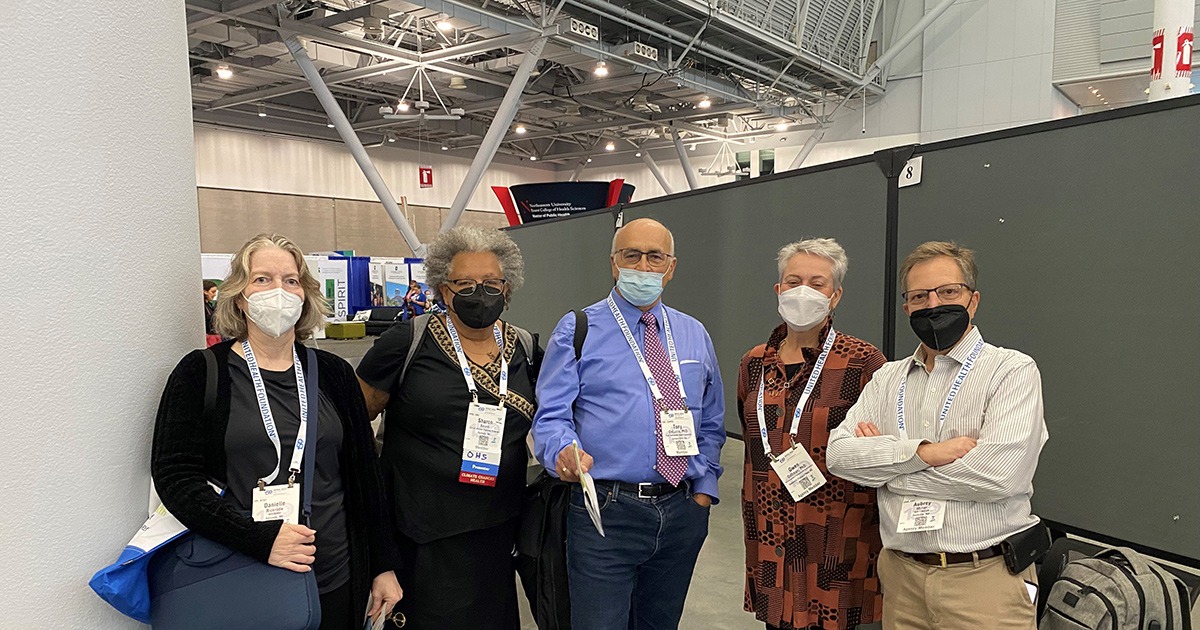The American Public Health Association (APHA) celebrated its 150th anniversary Nov. 6-9 in Boston, hosting some 12,500 attendees during its 2022 Annual Meeting and Expo.
Numerous NIEHS researchers and grantees made presentations, including Joan Packenham, Ph.D., director of the NIEHS Office of Human Research and Community Engagement and the Women’s Health Awareness Program.
Packenham presented a paper titled, “Addressing Environmental Health Disparities Utilizing a Community Engagement Framework Which Supports Research, Interventions, and Policy Development,” about the NIEHS Community Resiliency, Environmental Action, and Collaborations for Health Equity Study (REACH).
REACH explores the long-term impacts of COVID-19 on minority women and their families, who are already burdened with pre-existing environmental health disparities. The goal is to develop community-based programs for recovery and resiliency. Women older than 18 years who reside in North Carolina are eligible to enroll. The result was the creation of a community-centered environmental public health intervention platform known as the Women’s Health Awareness program.
Climate change and health, hot topics
NIEHS grantee Natasha DeJarnett, Ph.D., an assistant professor of environmental medicine at the University of Louisville, delivered several presentations on environmental justice and environmental health and equity. During an interview on APHA TV, she discussed the disproportionate health and climate burdens experienced by some communities and the importance of having a community-based participatory research approach in climate change and health research.
DeJarnett is a member of the NIEHS-funded EHS Core Center at the University of Louisville, and part of that center’s Multi-Organ Toxicology Research Interest Group. She is also the chair-elect for the APHA Environment Section.
Richard Kwok, Ph.D., program director in the Office of Scientific Coordination, Planning and Evaluation (SCOPE) and Aubrey Miller, M.D., deputy director of SCOPE, were active on panels discussing climate and disasters.
In a session moderated by Kwok, Miller spoke on “Facilitating Research Amidst Disaster Response: The NIH DR2 Program and Research Tools for Wildfires” The title references the National Institutes of Health (NIH) Disaster Research Response (DR2) program.
DR2 was created to better position research in the midst of disaster response by providing resources to improve the timeliness, quality, and value of disaster-related data collection and research studies, especially among disadvantaged communities, including research protocols, institutional review board guidance, and training materials.
During a poster session, Miller presented a poster titled, “Climate-Disaster Portfolio Analysis at the National Institutes of Health,” which discussed DR2 and its sister program, the NIH Climate Change and Health Initiative, a trans-NIH effort to expand understanding of the health impacts of climate change. The authors identified 350 NIH-funded projects related to climate change research, with most focused on weather-related topics.
The NIEHS exhibit booth at the APHA meeting, staffed by Devlin Sawyer and Robin Mackar from the Office of Communications and Public Liaison (OCPL), saw steady traffic throughout the event. Gwen Collman, Ph.D., director of SCOPE, joined her OCPL colleagues as her schedule permitted to respond to a myriad of questions about NIEHS research and career opportunities.
“With all the negative news of late, it was very refreshing to engage with a new generation of public health enthusiasts who are interested in making a difference,” said Mackar. “It gives you hope for the future.”
(John Yewell is a contract writer for the NIEHS Office of Communications and Public Liaison.)
Source link
factor.niehs.nih.gov


